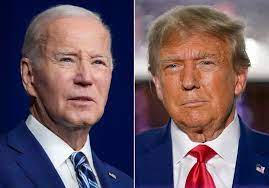By Amy Whitehouse
Biden’s been trumped: at least that’s what the Republicans are saying.
Joe Biden is president of the United States. But the Supreme Court, the Senate, and the House of Representatives suggest otherwise. In a Republican dominated political climate, can Biden, or the Democrats, legitimise a second term, or have they been truly trumped?
On November 5th 2020, Joe Biden won the presidential election race against Donald Trump, with 51.3% of the popular vote. Against the dystopian backdrop of civil unrest and Covid 19, Biden countered Republican attempts to disqualify his victory with an inauguration address determined to “press forward with speed and urgency”, dependent on “unity, unity”. Biden asked for, or promised, unity 8 times in his inauguration speech.

Yet as Biden’s first term reaches its concluding months, an evaluation of just how unified and functional American politics is becomes urgently necessary. Not only are the efforts of the Democrats and Biden limited by the developing chasm in political ideology in America, but there is a precedent being established that is larger than this. If the setting for forming and passing legislation in America continues to become more and more hostile, the democratic obligation of the US government, the Senate, Congress, is overshadowed by political competitiveness. The 2024 election becomes easier to win based on how far a candidate is willing to humiliate and degrade their opposition than on any of the social policies Americans should actually be asking for. Valence issues are forgotten for whose comeback is more cutting or which delivery of a speech earns more laughs. In 1960, Americans were surveyed on if their child marrying a member of the other political party would “disturb” them – 5% said yes. In 2010 – the figure was at 33% for Democrats and 40% for Republicans, with some now arguing that ‘partyism’ is now the main contributor to divisive prejudice in America. Likewise, a 2014 Pew study of 10,000 Americans found that the most politically informed on either side view the opposition not just as an ‘other’ but “so misguided that they threaten the nation’s wellbeing”. Politics is also the leading factor in determining opinion on climate change. Instead of supplementing deficiencies and problems in socio-economic issues, politics adds to the segregation and inequality that it is intended to solve. Trump looks right at home.
And this isn’t a sociological argument invented to reintroduce humility and accountability into politics. Biden has already felt firsthand, deservingly or not, the sufferings of further political bisection in the 21st century. Since the 2022 midterms, the Democrats have not had control over the House of Representatives, with the Republicans narrowly winning the majority. This was the first midterm in which the Democrats as the presidential party had gained Senate seats and lost House seats since 1962. In the supreme court – there is a 6-3 Republican majority, and in the Senate, the Democrats are only just in control, after the defection of Krysten Sinema to Independent. There is an expectation that the presidential party would not dominate any political space to the point of one-party politics, but cross-party success in each body of the US democracy should not interrupt the function of democracy to such an extent that the presidential party cannot deliver on any of its mandate. For instance, in 2023, Biden’s Clean Water Act caused 24 Republican-led states to sue the federal government, alleging the Biden administration establishing protections for seasonal streams and wetlands under the act violated the US constitution. While the opposition party should have the right to challenge and scrutinise the presidential party to allow for accountability in politics, excessive examples of this undermine election results and mean that when scrutiny is carried out it is through an expression of competitiveness rather than genuine ideological concern. A similar effect is observed in the UK when elections produce minority or hung governments.
Even in recent news, evaluating Biden’s first term and the upcoming election, there is a prominent focus on the wittiness or aggression of American politics. “Jokes and Jabs” (BBC) title the coverage of Biden’s ‘State of the Union’ speech this March. “Biden swipes at Trump” was another. Especially ironic was Biden’s claim that those of a similar age to him “see a different American story of revenge, resentment and retribution”, after bitter and unprofessional quipping from both him and Trump since they first became political opponents. It is far harder to find a report focusing on policy suggestions from the two candidates than this personal dislike, because the latter is what the 2024 election will be fought on, and what is now generally considered the interesting side of politics. Many of these articles argue that Biden’s age, as an 81 year old and the oldest president in history, necessitates this sharp-witted political strategy, but this should not mean that the formulation and delivery of policy, and the electorate’s issues, are overlooked. Biden has the worst rating of any modern president seeking re-election, and while Trump follows closely behind in the polls, both have a responsibility to prevent the continuing obsession with cynicism and unseriousness in American politics. Naturally there is a tribalism to politics, especially in an American landscape dominated only by the Democrats and Republicans, but when politics becomes a “fiery battle” in a time where pragmatic and honest decisions need to be taken on an international level, the falling popularity levels of both Trump and Biden among American voters should indicate that America cannot afford for its President to prioritise punchlines over policy.
Americans are worried about healthcare, the federal budget deficit, foreign policy, immigration, inequality, and gun violence. In 2022, 69% of Americans said that things were going pretty or very badly. When removing from consideration factors such as wealth, age, race and gender and purely considering a political perspective, this applies to Democrats and Republicans alike, in a climate where they seem programmed to be in strict opposition. A Democrat – “we’re more divided than we’ve ever been”. A Republican – “we have never been so divided as a nation on almost every topic”. An Independent – “The division among citizens continues to grow”. And while the blame for this is distributed between the incompetence of Biden, the control of the elitist or of the liberals, they’re all making the same point. They should not have to add babysitting the most powerful, and oldest, people in the country to the list of worries.
While there is of course space for personality within politics, and democratic elections operate on some base level of competitiveness and charisma, it is easy to see when this has crossed the line. We can joke that everything is bigger, louder, more colourful in the United States, but politics doesn’t have to be. “Unity, unity” in the light of the upcoming election appears to overlook the hostility that American politics has created, and it now seems naïve to imagine politics serving its intended function in America. If there is ever a pragmatic, moral, and professional presidential party in the United States, it will not have been inspired by American politics today.


